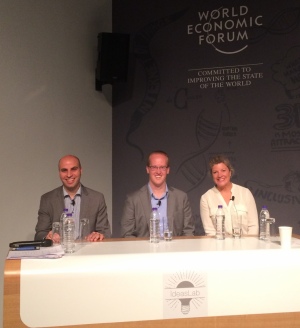Imperial at WEF: Could Big Data solve antimicrobial resistance?

Friendship Square, Dalian
A team of Imperial experts have highlighted how the latest tech innovations are tackling major healthcare challenges.
At the World Economic Forum in Dalian, experts in antibiotic resistance, tissue regeneration and brain implants presented an IdeasLab session to an audience of global business, political and scientific leaders.
The session formed part of the World Economic Forum’s Annual Meeting of the New Champions – which convenes fast-growing enterprises along with leaders from major multinationals, government, media, academia and civil society to consider innovations that will shape the future of business and society.
Man and machine
 Dr Tim Constandinou, from the Department of Electrical and Electronic Engineering, explained how his team is looking to develop generation brain-implantable technology which will would allow us to communicate from a living brain to IT systems. This could allow people who are paralyzed to control a wheelchair, he explained.
Dr Tim Constandinou, from the Department of Electrical and Electronic Engineering, explained how his team is looking to develop generation brain-implantable technology which will would allow us to communicate from a living brain to IT systems. This could allow people who are paralyzed to control a wheelchair, he explained.
They are using semiconductor technology to develop tiny, autonomous, wireless chips – the size of a grain of rice – which could be implanted into the brain.
Helping hand
Dr Ben Almquist, from the Department of Bioengineering, talked about new advances in tissue regeneration.

The Ideas Lab panel
Diabetes, obesity, and old age all lead to an inability to heal wounds, he explained. Survival is fundamentally linked to the ability to heal damage to our skin, and non-healing wounds have a massive impact on individuals and society.
Healing wounds is one of the most complex biological processes our bodies must perform. Historically, attempts to develop drugs to treat these wounds have been unsuccessful, he explained, because they tend to focus on only one of the many defects in this complex process.
Dr Almquist is working with a multidisciplinary using materials science, DNA nanotechnology, self-assembly, and additive manufacturing to design materials that coordinate biological activity and wound repair.
Data revolution
Dr Céire Costelloe, from the Department of Medicine, explored how big data is revealing new insights into antimicrobial resistance (AMR) and helping find ways to tackle the threat it poses.

Imperial's Data Science Institute
Dr Costelloe explained that we need to understand how antimicrobial resistant infections are transmitted at an individual, population and global level in order to understand how AMR occurs.
We are now routinely collecting vast amounts of healthcare, including information on the incidence and prevalence of infection, she said. Imperial is using data visualization to unlock the potential of this data, helping identify where outbreaks occur, where we can intervene to prevent transmission, and limit the impact of AMR on the world’s health
Chinese ties
Following the World Economic Forum presentations, the three researchers and Professor David Gann, Vice President (Innovation) addressed over a hundred alumni and special guests at a reception organized by Imperial College Alumni Association of South China.

Shenzen, China
Imperial is the UK’s top STEM collaborator with China. The College has more than 2,600 Chinese students and 7,000 alumni in China
Vice President (Innovation) Professor David Gann CBE said, "It's wonderful to see how the alumni association has grown since the event I attended in 2014. China is showing immense leadership in the world right now and it's clear that both Imperial and China are open for business. We're very proud of our partnerships with Chinese partners - including Huawei, the Chinese Academy of Sciences and a new signing with HNA group.”
Article text (excluding photos or graphics) © Imperial College London.
Photos and graphics subject to third party copyright used with permission or © Imperial College London.
Reporter
Deborah Evanson
Communications Division